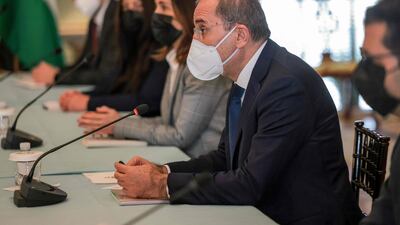Jordan is facing a mounting threat of illegal drugs from Syria, Foreign Minister Ayman Safadi told the UN special envoy to Syria on Sunday, while indicating the kingdom would continue efforts to end its neighbour's international isolation.
A Jordanian Foreign Ministry statement said Mr Safadi spoke to Geir Pedersen about “the mounting threat of drug smuggling from the Syrian territory to the kingdom” during their meeting in Amman.
Jordan has been at the forefront of Arab countries pushing for normalisation of ties with Syria under President Bashar Al Assad, an issue that has divided the region and contributed to an indefinite delay in convening this year’s Arab summit in Algiers.
In an indication of the divisions over Syria after nearly 12 years of civil war, Qatar hosted this week a meeting of different strands of the Syrian opposition, plucking them from obscurity after years of regional marginalisation.
One factor affecting the regional calculus towards the Assad regime has been an acceleration of a multi-billion dollar drug trade, mainly Captagon, flowing from Syria to Jordan, and from Jordan to inner Arabia.
Arab security officials say the Captagon comes mainly from areas controlled by Syrian regime forces and allied pro-Iranian militias. They attribute the increased smuggling over the past two years to diminishing production costs and the drying up of other illicit resources in Syria’s war-hit economy.
Mr Safadi said Jordan was working with the United Nations for a political solution to end the Syrian conflict and “restore Syria’s role in the region”.
He also said Jordan supported "getting Syria rid of terrorism", but did not give details.
The Arab League suspended Syria’s membership in November 2011 in response to the regime’s crackdown on an uprising against five decades of Assad family rule that broke out in March that year.
But Mr Al Assad’s ostracisation has reduced in the past four years and Jordan, with encouragement from Russia, has largely normalised ties with his government.
Officials have been pointing out the economic benefits while acknowledging that drug smuggling has increased.
Jordan is also seen as a supporter of a "step-by-step" approach towards Syria, which envisages the regime compromising on issues such as safe return of the refugees, and drug smuggling, in return for diplomatic recognition and reconstruction support.
Last month smugglers operating from a border area in Syria killed two Jordanian soldiers in an ambush. Two weeks later the Jordanian army said that it killed 27 smugglers, citing a toughened posture of troops on the Syrian border.
The killing of the soldiers prompted concern in Jordan about the safety of the units guarding the frontier and the rationale behind the normalisation with the Syrian regime.
Pro-government media in Jordan said the attackers from Syria returned to an area controlled by the Fourth Division, a praetorian guard led by the Syrian president's brother, Maher Assad.
The two killed soldiers belonged to tribes that form the backbone of the Jordanian military.


